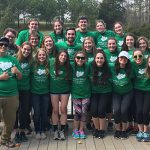
Posted on April 28, 2017
Walking through UD’s Trabant student center early this month, I saw a few student protestors standing next to an information table staffed by a campus chapter of Autism Speaks. The protestors’ signs read, “Autism Speaks doesn’t speak for me” and “Before you donate consider the facts.” I got excited at the sight of a little political activism in relation to disability issues on our campus, and eagerly wanted to join in.
With the protestors.
Many people wanting to help

Posted on April 13, 2017
What does it mean to be an ally? That’s something I asked my fellow University of Delaware colleagues multiple times over spring break and something nearly 600 UD students all over the country have been thinking about. They and I are a part of an organization called University of Delaware alternative Breaks (UDaB).
UDaB is a student-run organization at UD that coordinates service-based learning experiences across the country that focus on social issues. Our 20 trips this spring break emphasized

Posted on November 22, 2016
More than a month after Donald Trump defeated Hillary Clinton, the disability community shows little sign of letting go of its grief and fear and no wonder.
In Clinton, the community heard a candidate who took turns applauding people with disabilities (they’ve “changed things for the better in our country”) and advocating for them (they’re “too often invisible, overlooked and undervalued”).
She promoted a plan designed to push states to require health coverage for autism services in private insurance plans,
This entry was posted in autism, civil rights, community living, developmental disabilities, diversity, employment, inclusion, people with disabilities, physical disabilities, politics, public policy, subminimum wage, transportation, Uncategorized and tagged American Association of People With Disabilities, Barack Obama, Bill Clinton, disability community, Donald Trump, Hillary Clinton, IDEA funding, Individuals with Disabilities Education Act, National Council on Independent Living, New York Times, Rehabilitation Act, Serge Kovaleski.

Posted on August 19, 2016
The numbers are concerning. The percentage of children with autism in Delaware schools has more than tripled over the past 12 years and services have failed to keep up. Families report waiting more than a year to receive an accurate diagnosis after they first notice symptoms. And 62 percent of children under five had to see at least three different clinicians before autism was identified.
Why is it still so hard for people with autism and their families to receive
This entry was posted in autism, Center for Disability Studies, developmental disabilities, employment, people with disabilities, training, Uncategorized, University of Delaware and tagged Autism Delaware, Blueprint for Collective Action, CDS video, Delaware Department of Education, Delaware Department of Public Health, Delaware Family Voices, Delaware Network for Excellence in Autism (DNEA), Delaware schools, Leadership Education in Neurodevelopmental Disabilities (LEND), Nemours/A.I. DuPont Hospital for Children.

Posted on February 25, 2016
Question: How many times in the 15 debates for president have moderators specifically asked candidates about issues concerning disability?
a. 1 b. 5 c. 7 d. 11
If you answered b or c, thinking five or seven times sounds about right and should seem reasonable to the one-in-five people watching the debates who have a disability (and the more than 50 million Americans who live with a disability), you’re mistaken. The answer is “a” – one time. In September,
This entry was posted in accessibility, Americans with Disabilities Act, autism, Education, employment, Health and Wellness, inclusion, people with disabilities, public policy, Uncategorized and tagged Alzheimer's, autism, Ben Carson, Bernie Sanders, Convention on the Rights of Persons with Disabilities, Donald Trump, Hillary Clinton, Individuals with Disabilities Education Act, Jeb Bush, John Kasich, Marco Rubio, presidential debates, Social Security Disability Insurance Program, Ted Cruz, Tom Harkin.






